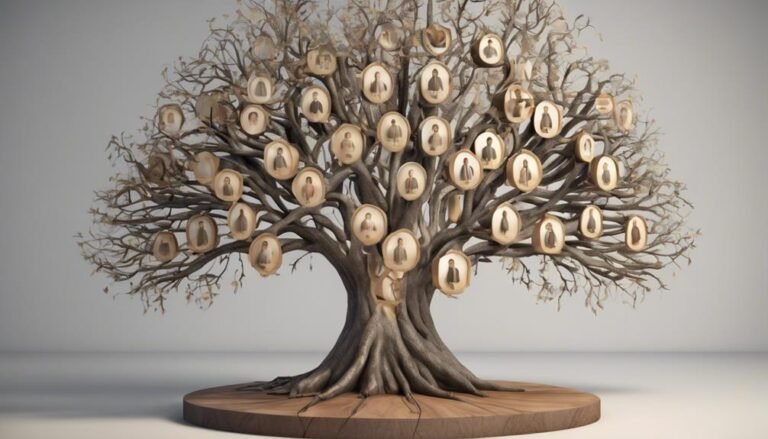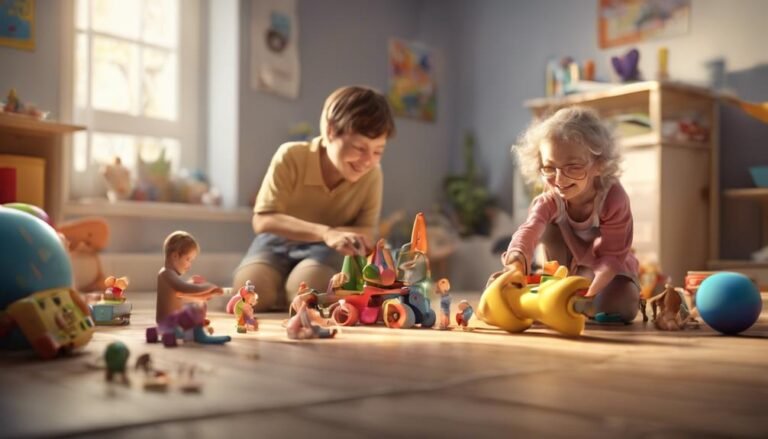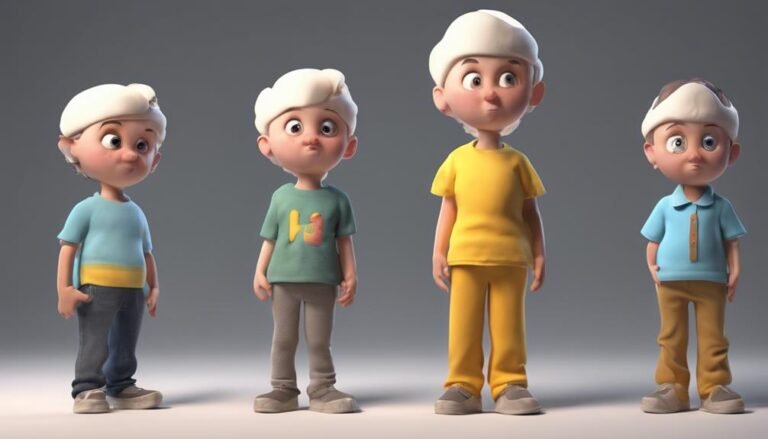Impact of Life Events on Personality Development
You may have noticed how certain life events have caused shifts in your personality over time. From unexpected opportunities to unforeseen challenges, these occurrences have the power to mold and refine who you are. But have you ever wondered how these experiences truly shape your character in the long run? The influence of life events on personality development goes far beyond mere exploration; it gets to the heart of what makes you uniquely you. Let's explore the intricate connection between the events you encounter and the person you become.
Key Takeaways
- Childhood experiences and traumas shape personality traits and emotional stability.
- Adolescence milestones like identity formation and peer influence impact personality development.
- Career transitions and changes influence self-confidence and personal growth.
- Relationship changes, like breakups or new love, impact beliefs and resilience.
- Health challenges, loss, and grief shape empathy, resilience, and personal growth.
Childhood Experiences
Exploring childhood experiences can provide valuable insights into the formative influences that shape an individual's personality development. Parental influence plays a significant role in shaping a child's personality. Positive parental involvement can foster confidence and emotional stability, while neglect or abuse can lead to long-lasting emotional scars.
Childhood trauma, such as witnessing violence or experiencing loss, can have profound effects on personality development, often resulting in issues like anxiety or difficulty forming relationships.
Sibling dynamics also play an essential role in shaping personality. Early experiences with siblings can teach important social skills like sharing, cooperation, and conflict resolution. Sibling relationships can impact how a person interacts with others later in life, influencing their ability to trust and collaborate with peers.
Understanding these aspects of childhood experiences is crucial in comprehending how personality traits develop and evolve over time. By delving into the dynamics of parental influence, childhood trauma, and sibling relationships, researchers can unravel the complex interplay of early experiences in shaping an individual's personality.
Adolescence Milestones
As you navigate through adolescence, forming your identity becomes a pivotal milestone.
Peer influence also plays a significant role during this period, shaping your beliefs and behaviors.
Understanding how these aspects interact can provide insights into your personality development during this pivotal stage of life.
Adolescent Identity Formation
During adolescence, individuals go through a pivotal period of self-discovery and identity formation, journeying through various milestones that shape their sense of self. This phase is marked by intense introspection, leading to self-acceptance and understanding of personal values.
Self-discovery involves exploring interests, values, and beliefs, which ultimately contribute to a growing sense of identity. Adolescents often engage in social comparison, evaluating themselves against peers or societal standards, influencing their self-perception and identity development. This comparison can either foster healthy growth by inspiring self-improvement or lead to negative impacts on self-esteem if unrealistic standards are set.
Additionally, self-expression plays an important role in adolescent identity formation, allowing individuals to showcase their unique traits and interests. Adolescents use different forms of self-expression, such as through art, music, fashion, or social interactions, to communicate their identity to the world.
Navigating these aspects during adolescence is fundamental in shaping a strong sense of self and fostering personal growth.
Peer Influence in Adolescence
Peer influence greatly shapes adolescent behavior and identity development, playing an essential role in guiding the milestones of adolescence. During this period, peers hold significant sway over teenagers, especially through channels like social media, impacting vital aspects like body image. Adolescents often compare themselves to their peers, leading to body image concerns and potential self-esteem issues.
Moreover, peer influence extends to academic pressure, affecting mental health. As teenagers navigate the demands of school and social circles, the pressure to excel academically can be intense. Peers can either alleviate this pressure through support and shared experiences or exacerbate it by fostering unhealthy competition.
Research suggests that positive peer relationships can promote resilience and emotional well-being, buffering the negative effects of academic stress. However, negative peer influences can contribute to anxiety and depression in vulnerable individuals.
Understanding the dynamics of peer influence is crucial in supporting adolescents through these formative years, ensuring they develop healthy relationships and a strong sense of self.
Career Transitions
Moving through career changes can be a challenging yet transformative experience that greatly impacts your personality development. When shifting between jobs, factors such as job satisfaction and work-life balance play a pivotal role in shaping your overall well-being. Research shows that individuals who experience positive changes in their work environment tend to exhibit higher levels of job satisfaction, leading to a more positive outlook on life.
Moreover, career transformations provide opportunities for professional growth and skill development. Embracing new roles or industries can push you out of your comfort zone, fostering personal resilience and adaptability.
The process of acquiring new skills and knowledge not only enhances your professional capabilities but also contributes to a sense of accomplishment and self-confidence.
Navigating career changes requires reflection, planning, and a willingness to embrace uncertainty. By proactively managing these transformations, you can cultivate a more robust personality that's resilient in the face of challenges and open to new opportunities for growth.
Relationship Changes
As individuals, breakups can profoundly impact your sense of self and identity, challenging your beliefs and values.
Similarly, going through a divorce can test your resilience, forcing you to adapt and grow in the face of adversity.
On the flip side, new love can bring about opportunities for personal growth and development as you navigate the complexities of forming a new relationship.
Breakups and Identity
During the tumultuous period following a breakup, individuals often experience significant shifts in their sense of self and identity. It's a time marked by self-discovery and emotional healing, where the individual navigates through the complex process of reconstructing their identity outside the context of the relationship. Research shows that breakups can serve as catalysts for personal growth, prompting individuals to reflect on their values, goals, and beliefs. This introspection can lead to a deeper understanding of oneself and one's needs, ultimately fostering a journey of self-discovery.
As you go through a breakup, you may find yourself questioning who you're and what you want out of life. This period of uncertainty can be unsettling but also presents an opportunity for personal development. Embracing this time for emotional healing can lead to a stronger sense of self and a clearer understanding of your identity.
Divorce and Resilience
Research suggests that divorce can act as a significant catalyst for developing resilience in individuals maneuvering through relationship changes. Coping strategies play an essential role in how individuals navigate the emotional turbulence that often accompanies the end of a marriage. People who've been through divorce may exhibit a higher level of emotional stability as they learn to cope with the challenges and uncertainties that arise during this period of change.
During divorce, individuals often find themselves drawing upon various coping strategies to manage the stress and emotional strain. These strategies may include seeking support from friends and family, engaging in therapy or counseling, or finding solace in activities that promote self-care and mental well-being.
Developing emotional stability amidst the turmoil of divorce can lead to increased resilience, enabling individuals to bounce back from adversity with newfound strength and determination.
New Love and Growth
Exploring new love can be a transformative experience that fosters personal growth and challenges existing perceptions and behaviors. In the domain of self-discovery and emotional maturity, venturing into a new romantic relationship can provide a profound opportunity for introspection and understanding oneself in the context of another.
As individuals navigate the complexities of a budding romance, they often encounter situations that demand emotional growth and maturity. This process involves learning to communicate effectively, manage conflicts constructively, and cultivate empathy and understanding towards their partner's needs and emotions.
Furthermore, new love can also prompt self-growth through vulnerability acceptance. Opening oneself up to another person requires a certain level of vulnerability that can be both challenging and empowering. By embracing this vulnerability and accepting one's imperfections, individuals in new relationships can foster a deeper connection with their partners and themselves.
This journey of vulnerability acceptance not only strengthens the bond between partners but also encourages personal growth and a heightened sense of self-awareness.
Health Challenges
Encountering health challenges can greatly influence your personality development, molding resilience and coping mechanisms in the face of adversity. When facing mental health struggles or chronic illness, individuals often undergo profound transformations that shape their character and outlook on life.
Mental health issues can lead to increased empathy, self-awareness, and a deeper understanding of human struggles. Coping with conditions like anxiety or depression can cultivate strength and compassion within you, fostering personal growth and resilience in the face of adversity.
Similarly, managing a chronic illness can instill patience, adaptability, and determination as you navigate the complexities of treatment and daily life. The constant challenges posed by such conditions can mold you into a more resilient individual, capable of facing difficulties with grace and perseverance.
These health challenges not only impact your physical well-being but also play a significant role in shaping your personality, fostering qualities of strength, empathy, and resilience that contribute to your overall personal development.
Loss and Grief
Experiencing loss and grief can profoundly impact your personality development, shaping your emotional resilience and capacity for empathy. When faced with loss, individuals often rely on coping mechanisms to maneuver through the complex emotions that come with grief. These coping mechanisms can vary widely, from seeking solace in social support systems to finding comfort in creative outlets or physical activities. Research suggests that actively engaging in these coping strategies can facilitate emotional healing and promote personal growth.
Grief is a multifaceted process that typically unfolds in stages, such as denial, anger, bargaining, depression, and acceptance. Understanding these grief stages can provide individuals with a framework for processing their emotions and moving towards acceptance and healing.
Support systems play an important role during this challenging time, offering a source of comfort, understanding, and companionship. Whether through friends, family, support groups, or mental health professionals, having a strong support network can aid in working through the complexities of grief and loss. By embracing coping mechanisms and leaning on support systems, individuals can gradually progress through their grief, fostering emotional healing and personal development.
Personal Achievements
Personal achievements can greatly shape your sense of self and contribute to your overall development. Academic success plays an important role in boosting your self-esteem. When you excel academically, it not only validates your hard work and intelligence but also enhances your self-worth. Achieving good grades or academic recognition can instill a sense of pride and accomplishment, laying a solid foundation for your self-esteem to flourish.
Similarly, athletic accomplishments can greatly impact your confidence levels. Whether it's scoring the winning goal in a game or beating your personal best in a race, these achievements can boost your self-assurance and belief in your abilities. Athletic success can show you that with determination and effort, you can overcome challenges and reach your goals, reinforcing a positive self-image.
Both academic and athletic achievements contribute to shaping your identity and character, influencing how you perceive yourself and interact with the world around you. Celebrating these accomplishments not only feels good in the moment but also leaves a lasting impact on your self-concept and personal growth.
Cultural Influences
Cultural influences play a pivotal role in shaping individual perspectives and behaviors. Cultural norms and societal expectations provide a framework within which individuals learn to navigate the world. These norms dictate what's considered acceptable or taboo in a given society, influencing how individuals interact with others and perceive themselves.
Family traditions and generational influences also greatly impact personality development. Growing up in a household that values specific customs or beliefs can instill certain values in individuals that shape their attitudes and behaviors throughout life. These traditions can be passed down through generations, creating a sense of continuity and connection to one's heritage.
Research has shown that individuals who are deeply rooted in their cultural identity tend to have a stronger sense of self and higher levels of self-esteem. Conversely, those who feel disconnected from their cultural background may struggle to establish a solid sense of identity.
Understanding and appreciating the cultural influences that have shaped you can provide valuable insight into your personality development and help you navigate the complexities of life with a greater sense of self-awareness.
Conclusion
As you reflect on the impact of life events on personality development, remember the intricate web of experiences that have shaped who you're today.
Each triumph and tribulation has molded your character, fostering resilience, empathy, and personal growth.
The journey of self-discovery continues as you navigate the complexities of life, drawing strength from the lessons learned and the relationships forged along the way.
Embrace the unknown with courage and curiosity, for the true essence of your personality lies in the tapestry of experiences yet to come.






